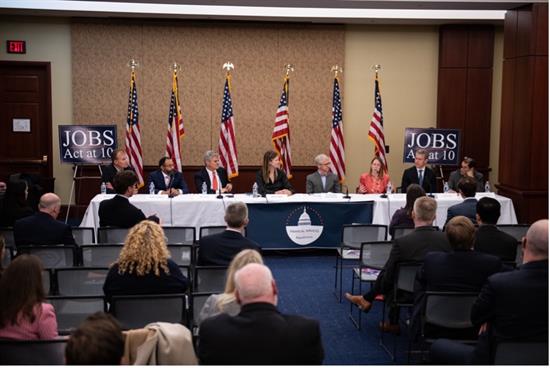This week, Ranking Member Patrick McHenry (NC-10), the top Republican on the House Financial Services Committee, hosted a roundtable to mark ten years of the Jumpstart Our Business Startups (JOBS) Act of 2012. The panel—moderated by Martha Miller, Director of the SEC’s Office of the Advocate for Small Business Capital Formation—consisted of a broad array of experts on capital formation. They discussed the many positive impacts of the law on small businesses and investors. They also looked forward to how Congress can build on its success to spur job creation, while giving everyday Americans more opportunities to build wealth through our capital markets.
 |
Listen to audio from the roundtable here or by clicking the image above.
At the roundtable, Ranking Member McHenry released a Republican report, which highlights the impact of the JOBS Act and how Congress can build on its success. Read the report here.
Read Key Quotes from the JOBS Act at 10 Roundtable:
Kicking off the roundtable, Republican Leader McHenry said the JOBS Act “reduced regulatory barriers and created new avenues within our securities laws to enable small companies and entrepreneurs to raise capital. And it was bipartisan. And it was the product of a Republican House, a Democrat Senate, and a Democrat White House.”
Emphasizing the importance of strong public markets and a regulatory environment that makes going public easier, Joel Trotter said, “imagine what Seattle would look like today—we were saying in 2011—if Microsoft was bought by IBM instead of going public and becoming an independent public company… 90-plus percent of job growth of growing companies happens after they become public.”
Discussing the need for greater opportunities for everyday Americans to build wealth through our capital markets, SEC Commissioner Hester Pierce said, “I believe in the power of our capital markets to transform people’s lives in ways that, you know, nothing else really can. But it will only work if we can make sure that more of the population is participating as investors, but also that more of the population is looking to our capital markets to say, ‘I can go build my business by drawing on the capital in those capital markets.’”
Outlining how the JOBS Act helped his biotech company raise capital and develop new COVID testing capability at the onset of the pandemic, Jonathan Cohen said, “remember, there was a time when we had no testing in the United States. We were one of the first companies to bring tests in the United States, validate them, and put them out. And we had the capital because we had been doing crowdfunding, so we had the capital to equip our lab to do the PCR… None of this, I don’t think, we could’ve done if there wasn’t equity crowdfunding.”
Looking ahead to how Congress can build on the JOBS Act’s success, Kevin Laws said, “when I think about what the JOBS Act did for most companies, is it enabled the companies to contact more of the investors that were already able to invest. What I would love to see now, is I’d love to extend the number of investors that can reach these companies safely.”
Bringing attention to ways Congress can get underrepresented groups involved in our capital markets to build wealth, Rodney Sampson said, “I do think we need to update the Accredited Investor definition… and whatever you do, please do not increase the [wealth] threshold. Some of us have worked a very long time to reach the current income and wealth minimums to be accredited investors and if we’re not in the game, it’s going to cut out a whole lot of early stage capital that’s funding the founders who are not accessing capital today because of bias and limited network access in the ecosystem.”
Speaking about the themes that will drive policy makers to build on the success if the JOBS Act, Steve Case said, “there are three themes I think could drive something forward. One is remaining the world’s most innovative entrepreneurial nation in the world, in a world that’s becoming increasingly competitive… The second is creating a more inclusive innovation economy, so that it’s not just a few people in a few places that are benefitting… And the third, which was also part of what drove the JOBS Act ten years ago, is getting people on both sides of the aisle, in what is continuing to be a sadly very hyper-partisan environment to realize it actually is important, every once in a while, to demonstrate that democracy works, and that people can come together and get something done.”
###